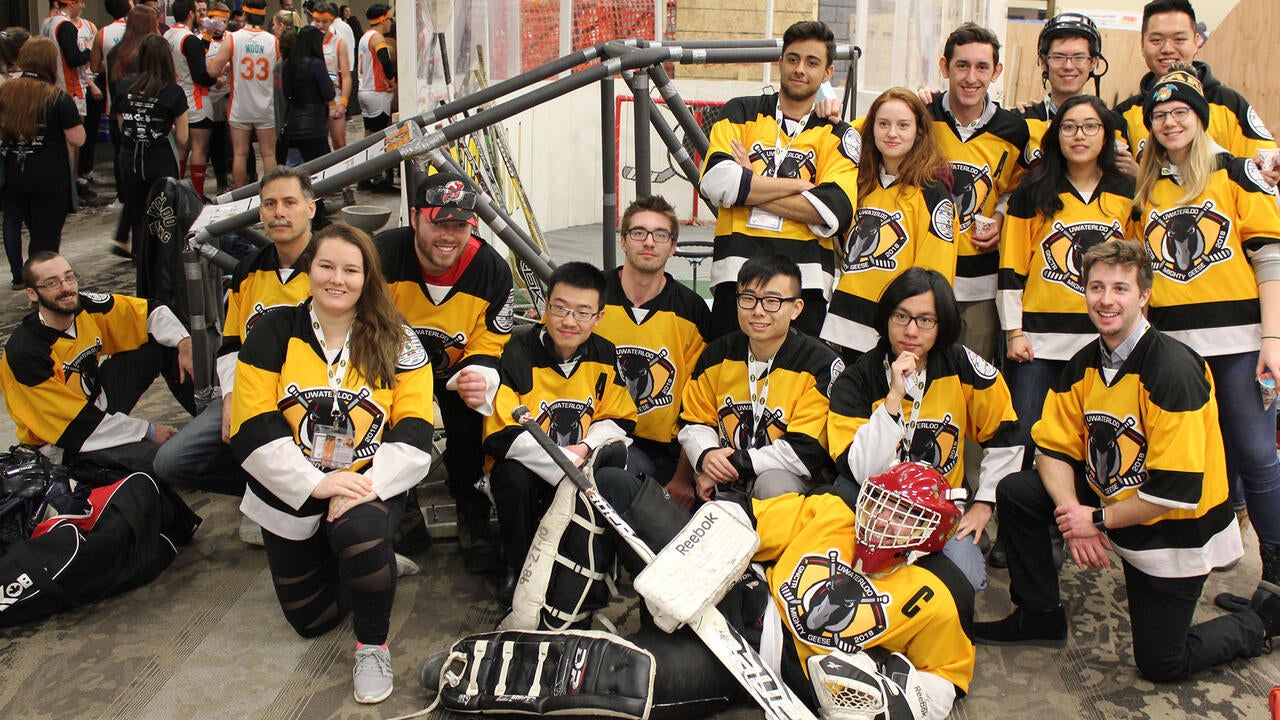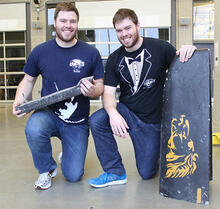
Waterloo's Mighty Geese Land Two Awards in Downhill Challenge
Hundreds of engineering students from coast to coast cement their design skills in this year’s Great Northern Concrete Toboggan Race.

Hundreds of engineering students from coast to coast cement their design skills in this year’s Great Northern Concrete Toboggan Race.
By Carol Truemner Faculty of EngineeringRussell Giles jokes that after this past weekend’s Great Northern Concrete Toboggan Race he doesn’t know what he’ll do with his spare time.
Leading up to the race hosted by Waterloo’s Faculty of Engineering, Russell, the captain of Waterloo’s Concrete Toboggan team, spent an average of 50-hours a week during the past couple of months working on the group’s toboggan.
For his efforts and the countless amount of time put in by the other 29 members of Waterloo’s 2018 Mighty Geese Concrete Toboggan Team, Waterloo students captured fifth place overall in the race that attracted 18 other teams — 17 from across Canada and one from the United States.
Approximately 500 people participated in the 44th annual race that featured toboggans engineering students designed and built with a concrete running surface. The toboggans were required to be less than 150 kg, withstand an impact at 80 kilometres per hour and include fully functional braking and steering systems.
Waterloo’s Mighty Geese toboggan was one of only six that made it past the finish line on Saturday’s race day at Kitchener’s Chicopee Tube Park. Russell, a fourth-year civil engineering student, said the rainy and spring-like weather conditions likely played a part in the large number of teams that only made it part way down the race track.
“The warmer weather was definitely a factor,” said Russel. “We used larger-sized front skis and we were the only team that steered from the rear. Both helped us to cross the finish line.”
The Southern Alberta Institute of Technology (SAIT) team took first place overall in the competition for which the actual downhill race results were just 30 per cent of the total score. The Mighty Geese won two awards: one for best steering and the other for the most esthetically pleasing technical display.
The nine-member organizing committee for this year’s Great Northern Concrete Toboggan Race are all former Waterloo Concrete Toboggan Team members and Waterloo Engineering students. Responsible for putting in the successful bid to host this year’s race, each put in hundreds of volunteer hours before and during the event to make sure it went off without a hitch.
Civil engineering alumnus Joe Stoner said he and the organizing committee members were passionate about the team when they were students.
“All of us thought it was a great idea to bring the competition to Waterloo,” said Stoner who was the captain of the 2013 Warrior Kart Concrete Toboggan Team.
 Waterloo Engineering’s 1998 Concrete Toboggan team, Arctic Fire Circle of Death, also participated in the event. The team members brushed the cobwebs off their original toboggan and competed in separate contests against two other alumni teams.
Waterloo Engineering’s 1998 Concrete Toboggan team, Arctic Fire Circle of Death, also participated in the event. The team members brushed the cobwebs off their original toboggan and competed in separate contests against two other alumni teams.
“The alumni commitment speaks volumes about how our team carries forward a legacy,” said the current team captain.
 Russell and his identical twin brother Graham, who is also in fourth-year civil engineering, have been members of Waterloo Engineering’s concrete toboggan team since they set foot on campus in 2014. Both set to graduate this spring, the siblings competed in their sixth and last concrete toboggan race on Saturday, an experience which Russell calls “bittersweet.”
Russell and his identical twin brother Graham, who is also in fourth-year civil engineering, have been members of Waterloo Engineering’s concrete toboggan team since they set foot on campus in 2014. Both set to graduate this spring, the siblings competed in their sixth and last concrete toboggan race on Saturday, an experience which Russell calls “bittersweet.”
“I’ve already let my teammates know that if they need any help or advice to give me a call or shoot me an email.”
The twins’ mom and dad were among the parents of the Mighty Geese members who cheered them on during the races that displayed the speed, braking, steering and control of toboggans in three race styles entitled Drag Race, Slalom, and King of the Hill.
The one family member not in attendance? The twins' brother Erik. Currently in New Zealand on his honeymoon, he is cutting his trip short by a few days for a good reason. A civil engineering graduate and a former concrete toboggan member himself, he plans to be in Waterloo later this week to present his brothers with iron rings at their engineering Iron Ring Ceremony on Saturday.

Read more
Here are the people and events behind some of this year’s most compelling Waterloo stories

Read more
Irfhana Zakir Hussain works to strengthen Waterloo’s capacity to withstand and recover from climate-related health crises

Read more
Meet the five exceptional graduate students taking the convocation stage as Class of 2024 valedictorians
Read
Engineering stories
Visit
Waterloo Engineering home
Contact
Waterloo Engineering
The University of Waterloo acknowledges that much of our work takes place on the traditional territory of the Neutral, Anishinaabeg, and Haudenosaunee peoples. Our main campus is situated on the Haldimand Tract, the land granted to the Six Nations that includes six miles on each side of the Grand River. Our active work toward reconciliation takes place across our campuses through research, learning, teaching, and community building, and is co-ordinated within the Office of Indigenous Relations.